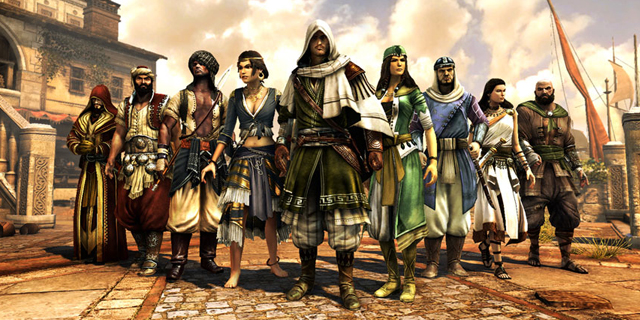
Ubisoft pulled off an amazing feat. They created a game with a great concept but flawed execution, took notes about what people did and didn’t like and then came back to us with Assassin’s Creed II, a game loved by just about everybody. With Brotherhood, they added the ability manage a whole team of assassins and a more rewarding combat system. It should be no surprise that Revelations is a game full of incremental improvements over its predecessor, and when you’re following up a game as good as Brotherhood, you don’t need a monumental jump in quality. It is enough to revisit Ezio and Altaïr as the overarching story moves forward.
Assassin’s Creed: Revelations adds a few new things to the established formula, and they all add to the experience. First, Ezio no longer has two hidden blades – he has a hidden blade on one wrist and a hook blade on the other. The hook blade allows for faster rooftop traversal by using the zip lines that are scattered throughout the city of Constantinople, faster getaways while running through the crowded city streets as you can now “hook and run” over people instead of running into them and having to regain your footing before continuing on, and it also makes climbing and jumping easier. The hook blade extends Ezio’s reach significantly while climbing towers and when a jump is just a hair too far the hook blade allows Ezio to dig in to whatever hold he can find instead of falling down into the crowded streets below.
One of my favorite parts of Assassin’s Creed: Brotherhood was recruiting assassins and sending them all over Europe to complete missions. I didn’t use them in combat a whole lot, as they were a sub-game for me to play and only really entered into the campaign when full synchronization required it. Now, assassin recruits gain experience not only for completing missions abroad, but also for fighting by your side. This is great, because it means that I don’t feel a need to drop what I am doing every time a recruit comes back from a mission – he or she can be useful to me on the remainder of my task and still be gaining experience. And don’t get frustrated, pigeon coops are still marked on your map. They are near bomb-crafting stations that are marked with a bomb symbol.
Bomb crafting is another new addition to the series. Ezio has always had smoke bombs, but the Constantinople assassins teach him how to create new types of bombs early in the game. You have room to carry one each of three types of bombs, and after using them for a while it feels like they’ve always been a part of the series. It feels great to collect ingredients, craft the bombs needed for the task at hand, throw a cherry bomb to distract some guards, run into the restricted zone, wait for your mark to make an appearance and then complete the mission by throwing a sticky bomb onto him as he walks away. Not only are bombs fun to use, but they make it much easier to get out of sticky situations.
The final addition to the game is Den Defense. Den Defense is a mini-game played when the Templars mount an attack against of your Assassin’s Dens. Instead of taking down a Borgia Tower and owning that zone forever the Templars will try to take territories back from you. I like tower defense. I completely understand that it is not for everybody, but I love examining the path, weighing pros and cons of unit types, placing barricades, and watching as my plan works spectacularly. It would be nice if there was an overhead view for unit placement, but showing the operation from Ezio’s point of view as he directs different units to different rooftops makes sense, too. What is even better is that Den Defense is completely optional. Installing a master assassin in a den will keep Templars at bay indefinitely, and if you don’t have a master to install you can always let the Templars take the den from you and then recapture it yourself by eliminating the guard captain and lighting a signal fire.
I won’t spoil the story for you, but if you’ve enjoyed the narrative up to this point, you’ll get wrapped up in the plot all over again here. And if you don’t care for the story the platforming and combat is as satisfying as it has ever been. I don’t know if there are big changes planned for Assassin’s Creed III, but so far I don’t think the series needs it. Revelations is proof positive that it works wonderfully to innovate once and then iterate and polish on future installments.
Pros: Small changes that keep things fresh
Cons: Largely an iterative experience, if that bothers you



















